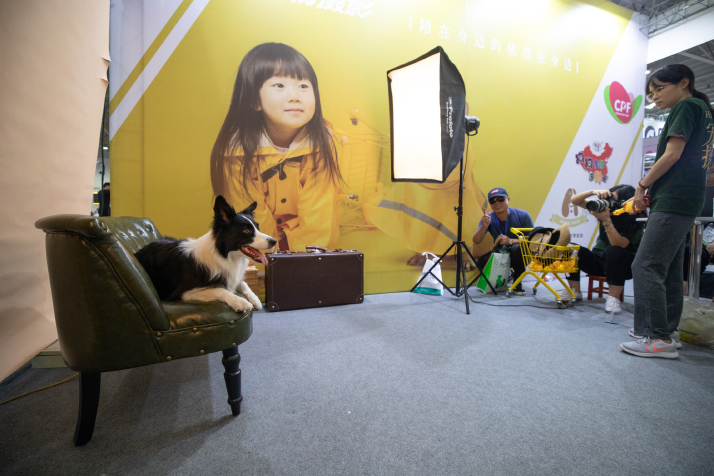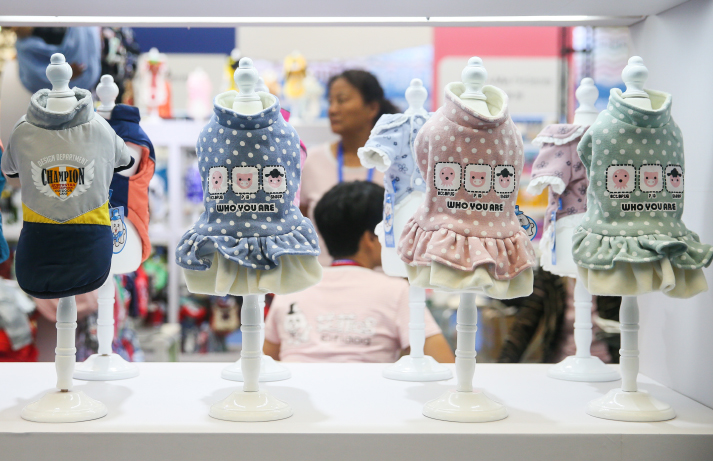| Business |
| A Purrfect Solution | |
| The rising preference for pets is driving the growth of an innovative industry | |
|
|
 A staff member of a photo studio take photos of a dog in Wuhan, Hubei Province in central China, on September 15, 2019 (XINHUA)
As the Spring Festival approaches, Shenzhen, Guangdong Province in south China, is festive, but Dai Xiaojing, a programmer who has lived in the city for nearly two years, needs to work late every day to complete her tasks before the long holiday. She seldom leaves her office before 9 p.m. But she feels relaxed thinking of her two little cats waiting for her at home. Living on one's own with pets has become a popular trend, especially for those pursuing careers in big cities far away from their hometowns. This lifestyle is giving impetus to a new economy—the pet business. Emotional need Damiao is Dai's first cat. He has been with her for four years since she was a postgraduate student at Peking University. When Dai started her life in Shenzhen, Damiao gave her a sense of belonging and security. "He is my friend and family member," Dai said, adding that the cat has met all the people important to her. Last year, the second cat, a ragdoll, came into her life on the anniversary of her grandfather's death. Although Dai does not have many friends in the city, she enjoys quality time at home with her pets. Cooking for the three or watching TV with the cats in her arms is the perfect way to spend leisure time for Dai. Emotional need is the main reason why young people including Dai keep pets. China's single population has reached 200 million, of which about 80 percent are young people, according to a survey released by iResearch, a consultancy firm. It says that 72 percent of young people live away from their hometowns, and 61 percent of them feel lonely from time to time. Another major group of pet owners is seniors. Today, China is experiencing rapid population aging, and is home to the largest elderly population in the world. By the end of 2018, there had been 249 million people aged 60 and above. Many of them live alone as their children are busy with their own work and life. The population of empty-nest elderly is expected to exceed 200 million in 2030. As a result, the number of cat and dog owners exceeded 61 million, with a total of 99 million cats and dogs in 2019, an increase of 8.4 percent over the previous year, according to a consumer report on the Chinese pet industry in 2019. And the size of pet market in China rose to nearly 203 billion yuan ($29.5 billion).  Pet clothing displayed at an international pet fair held in Shanghai on August 21, 2019 (XINHUA)
Changing habits Hao Zhongli, Chairman of China Pet Foods headquartered in Yantai, Shandong Province in east China, told Beijing-based Xinhua Daily Telegraph that the way to keep pets has also changed a lot, with people now usually feeding their cats or dogs nutritious food, snacks and even customized food. Dai told Beijing Review she buys a lot of goods for her cats including food, toys and cleaning materials. Besides deworming, cats need health checks twice a year. "Generally, I spend at least 500 yuan ($72.6) on them each month," she said. Sometimes, the new cat gets sick and the treatment costs 300 to 700 yuan ($43.6-$101.6) per vet visit. Young pet owners are setting new trends, Hao said. Cai bought her cats massage equipment after seeing advertisement on a shopping website, but used it only once because the cats were scared by the sound of the machine. Income growth leads to an upgrade in consumption. According to industry analysts, the pet industry can enter a period of high growth after the per-capita GDP reaches $8,000, while China has passed the $10,000 mark. Today, the pet industry in China is flourishing. Pet owners have a strong desire to showcase their pets on social media. It serves as a platform for people to share experiences about keeping pets, and also provides a channel for enterprises to promote their products. To meet the demands of pet owners for various pet services, special pet-service stores have emerged. Animal-themed cafes are popular among animal lovers. The industry has also generated new occupations, such as pet health care workers, according to the Ministry of Human Resources and Social Security. Developing market Despite the high growth, the pet industry is not without problems. China is yet to issue standards or regulations for the development of the pet industry. In the absence of supervision, quality of services for pets cannot be guaranteed. In addition, there are problems of pet abuse and abandonment, as well as difficulty in traveling with pets. For long-term development, policies on pet ownership and pet business need to be designed, which can clarify responsibilities of the parties involved, formulate a uniform industrial standard and ensure efficient supervision. In addition, social norms are needed to guide the behavior of pet owners when they accompany their pets in public areas. Some animal lovers have a penchant for special animals such as hamsters and spiders as pets. However, according to laws on wildlife protection, people need to apply for a license from forestry administrations before getting their unusual companions. It is also illegal to keep some protected wild animals such as the African grey parrot as pets. Since the main channel for this category of owners to get their pets is the Internet, relevant departments have stepped up efforts to crack down on wildlife online trades since 2016. Shops with irregular practices are shut down. It is also necessary to enhance the legal awareness among both ends of the market. Copyedited by Madhusudan Chaubey Comments to liqing@bjreview.com |
|
||||||||||||||||||||||||||||||
|